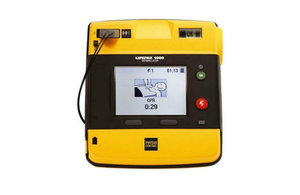Faulty defibrillator: users urged to check battery connection
People and organisations should check public access defibrillators for a technical fault, the Medicines and Healthcare products Regulatory Agency advised today.

LIFEPAK 1000 AED
People and organisations should check if they have the defibrillator model, LIFEPAK 1000 Automatic External Defibrillators (AED), because a technical fault with some of them means they may not deliver an electric shock to the heart to someone who is in cardiac arrest.
This issue could potentially affect all LIFEPAK 1000 devices. There are 10,068 devices in the UK.
These devices are available in public places such as schools, airports, football stadiums and leisure centres. They are often known as public access defibrillators (PAD) as they are intended to be used by anyone. They are also found in hospitals, clinics and ambulances. The manufacturer’s logo on the front cover may vary, displaying ‘Medtronic’ or ‘Physio-Control’.
The manufacturer, Physio-Control, has sent a safety alert to people with affected defibrillators with instructions for action. If you have not received an FSN from the manufacturer, please contact them directly. The Medicines and Healthcare products Regulatory Agency (MHRA) has issued a Medical Device Alert.
The fault is due to intermittent connection between the battery and device contacts because of wear and subsequent corrosion between both components. This could fail to deliver a shock to resuscitate a patient.
It is important that the manufacturer’s instructions are followed by completing and returning the confirmation sheet immediately.
People should check that the serial number listed in their confirmation sheet matches the serial number on the label located on the back of the device.
If your device powers off unexpectedly, either during inspection or during patient treatment, immediately remove and reinstall your existing battery to restore power to the device. If power is not restored, replace the battery with a spare battery and call Physio-Control immediately to arrange for servicing of your device.
It is important to implement a weekly schedule of battery removal and reinstallation for all LIFEPAK 1000 devices until contacted by Physio‐Control to arrange repair for any affected devices. Removing and reinstalling the battery on a weekly basis will help make sure your device is ready for use. It is also important to always carry a fully charged spare battery.
As part of the maintenance and testing schedule, users of the LIFEPAK 1000 Defibrillator should always follow the Operating Instructions which direct users to routinely inspect both the battery well and battery contacts, especially if the devices have been exposed to vibrations or the battery has been installed for an extended period without being removed.
John Wilkinson, MHRA’s Director of Medical Devices said:
These devices deliver life-saving treatment and it is vital they operate correctly when needed in an emergency.
People who are responsible for them should carry out the checks recommended by the manufacturer.
If you have any questions please contact Physio-Control on 0808 258 0094.
Notes to Editor
-
View the Medical Device Alert
-
View the Field Safety Notice.
-
Customer support for Physio-Control: 0808 258 0094, option 4, 08:30 - 17:00, Monday – Friday
-
For more information on the manufacturer please visit their website
-
Report any problems with medical devices to us via the Yellow Card Scheme
-
MHRA is responsible for regulating all medicines and medical devices in the UK. All our work is underpinned by robust and fact-based judgements to ensure that the benefits justify any risks. MHRA is a centre of the Medicines and Healthcare products Regulatory Agency which also includes the National Institute for Biological Standards and Control (NIBSC) and the Clinical Practice Research Datalink (CPRD). MHRA is an executive agency of the Department of Health.
Media enquiries
News centre
MHRA10 South Colonnade
London
E14 4PU
Email newscentre@mhra.gov.uk
Telephone (including out of hours): 020 3080 7651